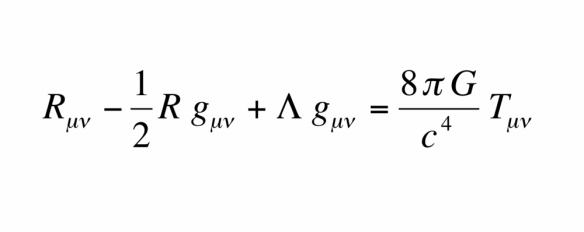I infer some agency (call it what you like) that has an innate capacity to create from will, intent, desire as opposed to an agency that is governed by laws (as in the physical universe).
That I map this agency to the “God” that appears in scripture is a totally unrelated step, that correspondence came much later for me. Initially I was compelled to admit that what I observe cannot be explained by science (for the reasons given earlier - namely we can’t use laws to explain the presence of laws) so must have HAS to have a different kind of explanation, something beyond our usual mechanistic explanations.
This whole problem for me, began to emerge while studying general relativity. That theory brings together energy, time, space, gravitation, acceleration into a single model where all of these things are formally related to one another - the so called Einstein field equations.
As you might know, Einstein spent the latter decades of his life seeking to incorporate the electromagnetic field into the geometric theory he had for gravitation, but he did not succeed.
When I looked at the geometric model Einstein (eventually, took him over a decade) devised, it has breathtaking beauty and conciseness, the final field equations are incredibly compact yet fully explain a great deal. I began to ask myself why these equations? where did these themselves come from? to what can I attribute as the cause for this:
The little gμν guy represents 16 non-linear partial differential equations (in four variables), represented by g00 thru g33. The form that these take depends on the coordinate system chosen to represent space-time in the region under consideration.
There is basically a profundity to these equations and the compactness of the notation make it look far simpler than it is, but although far from simple it is extremely elegant. (The LHS represents the geometric nature of spacetime and the RHS represents matter/energy).
I reasoned that if we ever did develop a “unified field theory” where all “forces” (in GR force is simply apparent, not a thing in itself unlike with Newton) are in fact just manifestations of a single more fundamental field then would we be able to go further in our understanding?
I began to see the answer as “no” we’d be faced with some profound mathematics that describes reality fully yet all we could do is stare at it, we could not reduce it, it would simply exist and itself be beyond any form of conventional explanation, we can discover laws but never explain there presence.
The very existence of these kinds or profound laws began to occupy me more and more and physics held no hope of an answer, science was useless here, I was dealing with a question that defies conventional materialist analysis. Where did these laws come from? what can possibly explain why there are such laws?
So that is what I inferred, an agency that was able to give rise to such laws and not itself be subject to laws, if not subject to laws, rules then to what can we attribute the elegance and beauty? I reasoned it must be “will” or “intent” or “mind” akin to my own mind but vastly superior.
The option “it just is that way” or “it has always been that way and just is” were unsatisfactory, something else was going on here, the laws were clues, evidence of something incredible.
Equating this to the “God” in the Bible came later.

